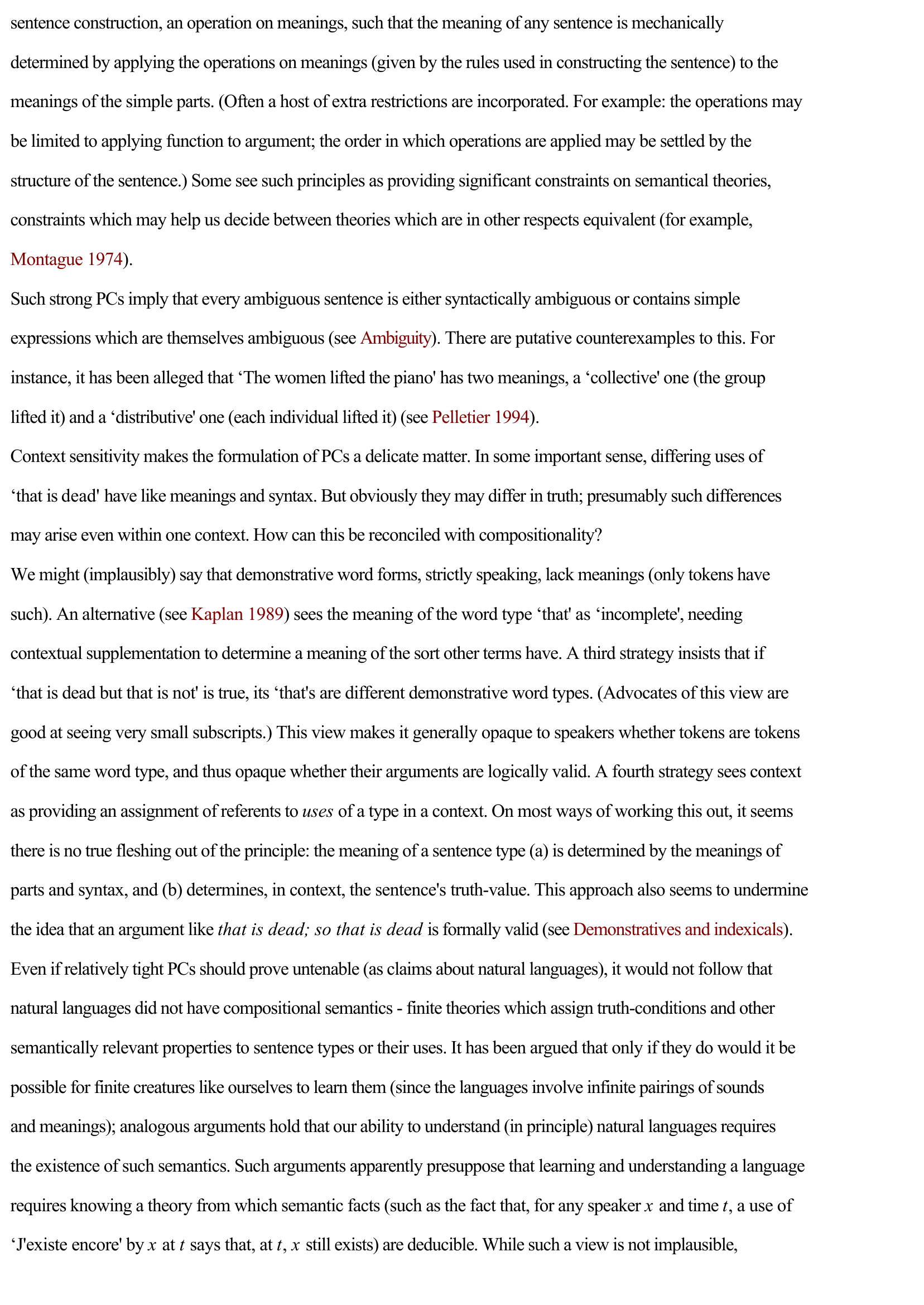Compositionality
Publié le 22/02/2012

Extrait du document
«
sentence construction, an operation on meanings, such that the meaning of any sentence is mechanically
determined by applying the operations on meanings (given by the rules used in constructing the sentence) to the
meanings of the simple parts.
(Often a host of extra restrictions are incorporated.
For example: the operations may
be limited to applying function to argument; the order in which operations are applied may be settled by the
structure of the sentence.) Some see such principles as providing significant constraints on semantical theories,
constraints which may help us decide between theories which are in other respects equivalent (for example,
Montague 1974 ).
Such strong PCs imply that every ambiguous sentence is either syntactically ambiguous or contains simple
expressions which are themselves ambiguous (see Ambiguity ).
There are putative counterexamples to this.
For
instance, it has been alleged that ‘The women lifted the piano' has two meanings, a ‘collective' one (the group
lifted it) and a ‘distributive' one (each individual lifted it) (see Pelletier 1994 ).
Context sensitivity makes the formulation of PCs a delicate matter.
In some important sense, differing uses of
‘that is dead' have like meanings and syntax.
But obviously they may differ in truth; presumably such differences
may arise even within one context.
How can this be reconciled with compositionality?
We might (implausibly) say that demonstrative word forms, strictly speaking, lack meanings (only tokens have
such).
An alternative (see Kaplan 1989 ) sees the meaning of the word type ‘that' as ‘incomplete' , needing
contextual supplementation to determine a meaning of the sort other terms have.
A third strategy insists that if
‘that is dead but that is not' is true, its ‘that's are different demonstrative word types.
(Advocates of this view are
good at seeing very small subscripts.) This view makes it generally opaque to speakers whether tokens are tokens
of the same word type, and thus opaque whether their arguments are logically valid.
A fourth strategy sees context
as providing an assignment of referents to uses of a type in a context.
On most ways of working this out, it seems
there is no true fleshing out of the principle: the meaning of a sentence type (a) is determined by the meanings of
parts and syntax, and (b) determines, in context, the sentence's truth-value.
This approach also seems to undermine
the idea that an argument like that is dead; so that is dead is formally valid (see Demonstratives and indexicals ).
Even if relatively tight PCs should prove untenable (as claims about natural languages), it would not follow that
natural languages did not have compositional semantics - finite theories which assign truth-conditions and other
semantically relevant properties to sentence types or their uses.
It has been argued that only if they do would it be
possible for finite creatures like ourselves to learn them (since the languages involve infinite pairings of sounds
and meanings); analogous arguments hold that our ability to understand (in principle) natural languages requires
the existence of such semantics.
Such arguments apparently presuppose that learning and understanding a language
requires knowing a theory from which semantic facts (such as the fact that, for any speaker x and time t, a use of
‘J'existe encore' by x at t says that, at t, x still exists) are deducible.
While such a view is not implausible,.
»
↓↓↓ APERÇU DU DOCUMENT ↓↓↓







